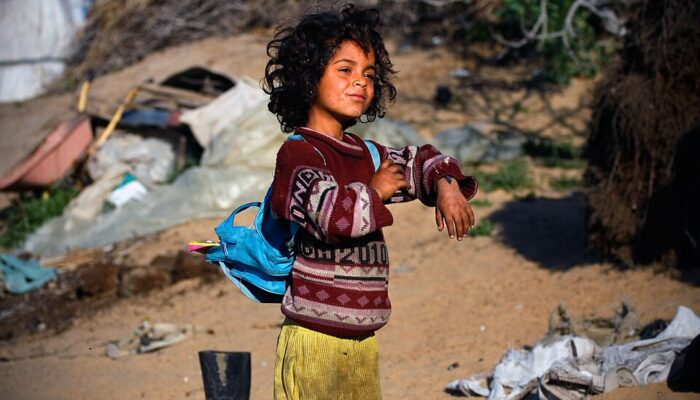

Sabha,6, getting ready to walk to school from her house on the borders eastern Gaza strip, where she and her family are still living in tents. (Photo: Wikimedia Commons)
By Alissa J. Thompson
I have tattoos — several, in fact. The one on the inside of my left forearm, inked in black and printed in Koine Greek, translated says, According to Matthew 18:3. The verse? Truly I tell you, unless you change and become like children, you will never enter the kingdom of heaven.
Jesus uttered these words in response to one of the disciples’ countless egotistical inquiries. “Who is the greatest in heaven,” they wanted to know (hoping it would be them, of course). So, Jesus pulled a child into their midst and told them, “This one will be the greatest, and if you get in her way, there are millstones awaiting your neck.”
With an admonition like that, I’d feel pretty humiliated if I were a disciple.
With precious few references to children throughout the Gospels, I cherish these teachable moments. For in them, we catch a glimpse of not only Jesus’ love of children, but their standing in the divine order of things.
In a time when infant exposure and infanticide were not uncommon practices, Jesus pulled the utilitarian children out from the margins and into the dead center of the kin-dom. With it, Jesus proclaimed the most vulnerable would be first — and that included the little ones. Their humility and meekness made it so.
Children are vulnerable, which makes it no surprise Jesus would elevate them in the kin-dom. Their dependency on others for care occupies a particular place in the social order. A la Darwin, children are not exactly fit to survive on their own. Their very existence is contingent upon those of us who can and will provide the base of Maslow’s hierarchy, at the very least.
It is also contingent upon the body politic to uphold children’s value in any given society. And when that body politic neglects to see the Imago Dei in certain bodies, the results can be catastrophic.
“Let them come,” Jesus said. But that is infinitely harder to do, if not impossible, if the child is starving.
I have been haunted by the recent images coming out of Gaza. Without humanitarian aid for more than 60 days, already malnourished children are dying of preventable starvation. I have mourned the curvature of their rib cages and spines jutting through their pale skin. I have lamented their sunken-in cheekbones and dark, helpless eyes. I have writhed, watching mothers and fathers wail as they cradle their children’s now-lifeless bodies, with bloated tummies and brittle bones.
And all I can think about is “yes.” Jesus said let the children come — but not like this. He blessed the children, not cursed them to starvation.
Starvation as a war tactic is considered a war crime. The numbers are inconclusive, but some reports indicate upward of 290,000 children in Gaza are “on the brink of death.” Meanwhile, the international community remains largely silent, as do large swaths of the church.
Are we, as Christians, to ignore these emaciated, innocent bodies? What does it say of our faith convictions if we are reticent to respond to the horror and suffering of the least of these? And what kind of church are we if not one that feeds the hungry?
He said to let them come; but they are too malnourished and weak, Lord, to walk.
The world and the church have abdicated their responsibility to Gaza’s children, with few exceptions — South Africa and Pope Francis being among them. The lack of response and accountability from the world community is astonishingly cruel and tragic.
Perhaps more wretched, though, is the silence and inaction of those who claim to follow Jesus. In light of Gaza’s children, how can we read Matthew 25 and not see we are starving the body of Christ? What good are multiplying loaves and fishes if we blockade them? With every one of those small bodies that waste away, so, too, does our very humanity. Who have we become that we would allow for such wickedness?
Surely this is not what Jesus had in mind for his children. And if the children of Gaza cannot come to Jesus on account of their withering, then we must find a way to get to the children. As people of The Way, we cannot allow the body politic to determine who is worthy of bearing the image of God. Jesus already has exalted the children in heaven. What more do we need to see or hear?
This is a metanoia moment. We must turn as Jesus instructed in Matthew 18:3. Or perhaps we are the ones who should be wearing those millstones.
— Alissia J. Thompson serves as pastor of The United Church of Granville in Granville, Ohio. She earned a Master of Divinity degree from the University of Chicago and is currently working on a doctor of ministry degree at Fordham University. She resides in Newark, Ohio, with her wife and flock of fur and feather. This article first appeared on Baptist News Global on May 8, 2025 and is reprinted here with permission.
Leave a Reply Cancel reply
You must be logged in to post a comment.
Recent Posts
- The Body of Christ, the Family of God and the Border: Christian Responses to the Immigration Crisis
- When Churches Are No Longer Sanctuaries: An Immigrant Theologian-Pastor’s Reflection
- Risk is the Cost of Following Jesus
- About This ‘Special Issue of CET’
- The Real Scapegoats, According to Matthew and Girard


